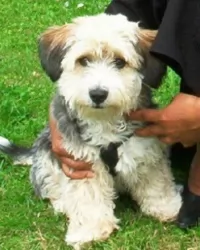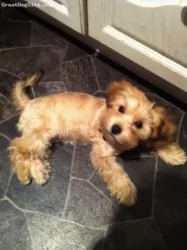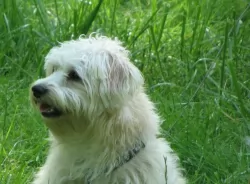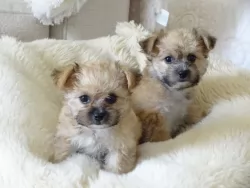 MyDogBreeds
MyDogBreeds Both Yo-Chon and Chesapeake Bay Retriever are originated from United States. Yo-Chon may grow 36 cm / 14 inches shorter than Chesapeake Bay Retriever. Yo-Chon may weigh 41 kg / 90 pounds lesser than Chesapeake Bay Retriever. Both Yo-Chon and Chesapeake Bay Retriever has almost same life span. Yo-Chon may have less litter size than Chesapeake Bay Retriever. Yo-Chon requires Moderate maintenance. But Chesapeake Bay Retriever requires Low maintenance
Both Yo-Chon and Chesapeake Bay Retriever are originated from United States. Yo-Chon may grow 36 cm / 14 inches shorter than Chesapeake Bay Retriever. Yo-Chon may weigh 41 kg / 90 pounds lesser than Chesapeake Bay Retriever. Both Yo-Chon and Chesapeake Bay Retriever has almost same life span. Yo-Chon may have less litter size than Chesapeake Bay Retriever. Yo-Chon requires Moderate maintenance. But Chesapeake Bay Retriever requires Low maintenance
 The Yorkie Bichon or Yo-Chon as he is fondly referred to as a designer crossbreed hailing from the United States.
The Yorkie Bichon or Yo-Chon as he is fondly referred to as a designer crossbreed hailing from the United States.
Information isn’t readily available on the origins of this cute little dog, but the dog is believed to be a cross between a Bichon Frise and Yorkshire Terrier.
It is thought that the dog was developed in the United States from about 1998 to 2001. As a hybrid, the Yorkie Bichon isn’t recognized by the American Kennel Club.
 Fondly referred to as the Chessie, the ‘Labrador-look-alike’ Chesapeake Bay Retriever’s history extends to St. Johns Newfoundland pups which were rescued off a ship off the coast of Maryland in 1807. The Chesapeake is an American breed.
Fondly referred to as the Chessie, the ‘Labrador-look-alike’ Chesapeake Bay Retriever’s history extends to St. Johns Newfoundland pups which were rescued off a ship off the coast of Maryland in 1807. The Chesapeake is an American breed.
It is believed that the Newfoundland puppies as they grew, were bred with area dogs, with there being few records of the early dogs, but it is believed that spaniels and dogs were included.
In 1918 the Chesapeake Bay Retriever was recognized by the American Kennel Club and in 1964 the dog was declared the official dog of Maryland.
 The Yo-Chon stands between 25 and 30cm and weighs in the region of 2 to 4kg. He can be like a teddy-bear this little dog and the coat can be either silky and straight or wavy. It is medium length and some people have the coat professionally trimmed.
The Yo-Chon stands between 25 and 30cm and weighs in the region of 2 to 4kg. He can be like a teddy-bear this little dog and the coat can be either silky and straight or wavy. It is medium length and some people have the coat professionally trimmed.
The low shedding coat comes in a variety of colors – cream, grey, tan, white, black or bi-colored.
Your Yorkie Bichon will no doubt have some habits that come from both parent breeds. Your dog is likely to be independent, social, friendly, social and loving, wanting to spend lots of time with you.
They’re small but they make good watchdogs with their high-pitch bark. Your Yo-Chon is an intelligent little dog too and by having him trained and socialized he is well behaved and pleasant to have around. You can tell him to lie down, sit or stay which is useful when you have visitors.
He gets on well with children, but the puppies particularly are tiny and fragile and they can easily get hurt by untrained and undisciplined children.
 The Chesapeake is a large dog belonging to the Sporting breed group. Perhaps one of the more distinctive features of the Chesapeake Bay Retriever is the yellowish eyes.
The Chesapeake is a large dog belonging to the Sporting breed group. Perhaps one of the more distinctive features of the Chesapeake Bay Retriever is the yellowish eyes.
This is a strong, well muscled dog that stands anywhere from 61 – 66cm and weighs between 30 – 45kg. The short, thick coat of the dog is waterproof and comes in colors ranging from brown to reddish yellow to chestnut shades.
The head of the Chesapeake is broad and roundish with medium length floppy ears. The tail is long. The toes are webbed which helps makes the dog an excellent swimmer as well.
The Chesapeake Bay Retriever is a happy kind of dog with a bright, alert, intelligent expression. He loves water and is guaranteed to make a wonderful pet for any family.
With his wonderful characteristics, it is worth training him and socializing him as this training sets parameters for him so that he becomes a wonderfully obedient dog that gets on well with other pets in the home as well as with children.
 The Yo-Chon is an independent, happy dog who loves nothing more than to be surrounded by all his favorite human beings.
The Yo-Chon is an independent, happy dog who loves nothing more than to be surrounded by all his favorite human beings.
They are loving, loyal and gentle dogs and are good playmates for children who have been taught how to handle them with care and kindness.
He is smart and has an amicable nature and will take kindly to being trained and socialized.
With the Yo-Chon in your life, you can be sure you’re going to benefit from having a splendid family pet and companion.
 The Chesapeake Bay Retriever is ready to be your best friend and companion. This dog breed is highly active and he’ll fit easily into a family that is active and can ensure he is involved in all their activities.
The Chesapeake Bay Retriever is ready to be your best friend and companion. This dog breed is highly active and he’ll fit easily into a family that is active and can ensure he is involved in all their activities.
The beauty about the Chesapeake Bay Retriever is that he is generally an even tempered dog, and once trained and socialized, becomes a truly splendid pet, one that will be loving and loyal with his owners.
 Both the Yorkie and Bichon Frise are dog breeds that are prone to Legg-Calvé-Perthes disease. This is when there is insufficient blood supply to the hind thigh bone, so the dog becomes lame.
Both the Yorkie and Bichon Frise are dog breeds that are prone to Legg-Calvé-Perthes disease. This is when there is insufficient blood supply to the hind thigh bone, so the dog becomes lame.
Surgical correction is necessary. Like small dogs in general, the Yochon might have dental issues. Slipped kneecaps, hypothyroidism and eye problems might affect the Yochon as well.
 By taking good care of your Chesapeake, you can ensure his teeth remain strong, his nose is wet and his coat glossy and healthy. He is a robust breed as it is, but there are always some common dog diseases to watch out for -
By taking good care of your Chesapeake, you can ensure his teeth remain strong, his nose is wet and his coat glossy and healthy. He is a robust breed as it is, but there are always some common dog diseases to watch out for -
Obesity is an ailment that is afflicting many humans and their pets. Being overweight can bring on a host of unwanted diseases. Obesity is a serious disease that can contribute to digestive disorders, back pain, heart disease and joint problems.
Instead of showering him with little treats to show him how much you love him, rather stroke him or play a game with him – it’s the ultimate treat for him – your attention.
Remember that if you aren’t going to let your Chessie become a parent, the best thing you can do for your male or female is to have them spayed or neutered. In fact, spaying or neutering can decrease the likelihood of your pet getting certain types of cancers as well as other illnesses. Speak to your vet and discover how these procedures can be very beneficial for your pet.
 Everybody is busy and they don’t always have time to exercise their pets. As a human being, your health relies heavily on the exercise you get so you and your dog can exercise together.
Everybody is busy and they don’t always have time to exercise their pets. As a human being, your health relies heavily on the exercise you get so you and your dog can exercise together.
These days if you seriously don’t have time and you have money to spare, there are excellent doggy daycare centers where your dog can have fun playtimes with other dogs and people.
Dog exercises will change over time with age but at least try to get used to giving your pet a walk every day as this kind of exercise can extend into old age with both you and your pet.
Swimming, ball games, fetch games and walks or hikes are all great forms of exercise.
Good nutrition ensures your Yorkie Bichon has a good chance to be healthy and energetic. Some of the commercially manufactured dog foods you get are made with bad ingredients and they can make your dog sick.
The good quality ones can be nutritious for your dog and also wonderfully convenient. Always read the packaging labels so you know what your dog’s getting.
Cooked vegetables, boiled chicken and brown rice, nicely chopped up and added to the dry kibble can add variety to your pet’s diet while remaining deliciously nutritious and tasty as well.
Brush your Yo-Chon at least twice a week to keep the hair silky and shiny. Clip your dog’s nails when they get long.
Check inside his ears for signs of redness and the possibility of an infection. Try and look inside his mouth too for bad teeth as this can cause lots of health problems for your pet.
If you don’t have the time to do all these things, there are professional pet groomers who will do all these grooming chores for you.
 The Chesapeake Bay Retriever sheds fairly heavily throughout the year. The coat should be brushed at least twice a week to remove dead hair. Brushing is good for the dog too as it distributes the oils of the skin, making his coat shinier.
The Chesapeake Bay Retriever sheds fairly heavily throughout the year. The coat should be brushed at least twice a week to remove dead hair. Brushing is good for the dog too as it distributes the oils of the skin, making his coat shinier.
Because the Chesapeake has floppy ears, the ears will need to be checked on a weekly basis for signs of infection. This is of particular importance if your Chessie loves to spend time splashing around in water. The veterinarian can recommend and also advise on cleaners for your dog’s ears.
An excellent diet and plenty of exercise will ensure your Chessie can live to be 11, 12 or 13 years of age. You want to keep his diet of kibble, rice, vegetables and meat consistent so as not to upset his stomach.
Avoid giving him foods such as chocolates. Do research on the harm you can do to your pet when you feed him some human foods that are entirely not meant for a dog’s digestive system.
The Chesapeake Bay Retriever has always loved to be active - hunting for- and retrieving birds from rivers and lakes. He is used to being active and will require a good supply of exercise. Take him for long walks and let him join you on your runs or your cycling.